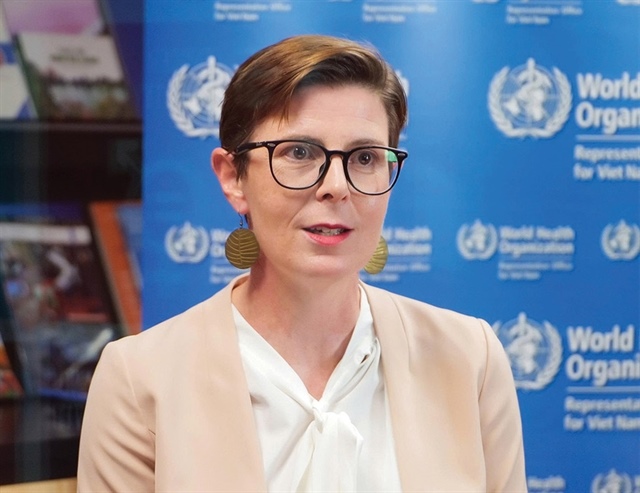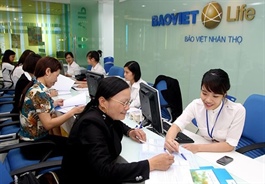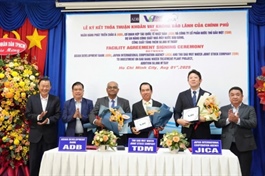Clearer guidance can add to progress in health financing
Clearer guidance can add to progress in health financing
Vietnam has been making progress in health financing, driven by crucial reforms. Dr Angela Pratt, representative in Vietnam for the World Health Organisation, talked to VIR’s Bich Thuy about the key factors for the country to overcome related challenges.

Dr Angela Pratt, representative in Vietnam for the World Health Organisation |
How is health financing developing in Vietnam, and what are the major issues involved?
Vietnam’s health financing system has evolved considerably in recent years, marked by progressive legislative reforms, ambitious universal coverage goals, and ongoing government restructuring.
The system is well-positioned to take advantage of opportunities to expand access so that everyone everywhere has access to quality healthcare, without financial hardship. This means everyone everywhere in Vietnam can enjoy better health.
Vietnam now has nearly 94 per cent of its people covered by health insurance. This is impressive and a cause to celebrate. It means more people getting the healthcare they need, without unexpected health costs hurting their household budget.
To achieve even better health financing, the government now has a high-level commitment to achieving free healthcare by 2035.
Despite the successes, Vietnam still has a very high rate of out-of-pocket expenditure, now above 40 per cent of total current health expenditure, meaning people are spending more on health than is covered by their health insurance. The aim for out-of-pocket expenditure is that it should be below 20 per cent.
Out-of-pocket expenditure on health can pose a significant financial burden on households, particularly in rural and low-income populations.
Furthermore, the transition away from donor funding, coupled with an ageing population and the rising burden of non-communicable diseases, and the commitment to strengthening the commune health system, increases fiscal pressures and requires innovative ideas for continuing to improve Vietnam’s health financing mechanisms while expanding access to services.
Overall, Vietnam has made strong strides. It is now focusing on tackling high out-of-pocket spending and boosting service coverage, through the commune health system.
How important is health financing in achieving universal health coverage in Vietnam?
Universal health coverage emphasises two concepts: access to services for all, and ensuring these services are delivered without financial hardship.
Adequate financing, through a combination of state budget and health insurance, is critical to achieve universal health coverage. Moreover, if designed and implemented strategically, it can orient health service providers to be more efficient by using resources more effectively, reducing waste, while improving quality of care.
Access to services requires financing for infrastructure, the adequate and appropriate remuneration and capacity building of the health workforce, a sustainable supply of essential medical products including vaccines, medicines and equipment, a strong digital health information system and good governance.
What are the key factors for a country to succeed in this area, and what lessons from other countries could Vietnam learn from?
Successful health financing requires a number of factors. They include strong political commitment across all levels of the government administrative system, and adequate public funding from the state budget and social health insurance.
It also needs rules, regulations, and monitoring to ensure funds are used in equitable and efficient ways, as well as appropriate service delivery arrangements to ensure the right service is given at the appropriate time, and at the right level of care.
For Vietnam, a focus on keeping people healthy and avoiding illness is a valuable strategy with the potential to generate huge cost savings over time, making healthcare less costly for everyone.
What are the solutions and strategies for Vietnam to improve the efficiency of health financing, and how can stakeholders contribute to the effort?
The keys to efficiency vary by context and country. However, there are a few important guiding principles: reducing fragmentation in how funds are pooled; linking at least some component of the renumeration of health workers to performance and to the health needs of the people they serve; and aligning coverage policies with policy objectives.
There should also be focus on quality primary healthcare and the commune health system in Vietnam, as this is the most cost-effective and effective way of providing most of the health services that people need. Using innovation, for example, means utilising digital technologies to save the time of health workers and facilitate diagnosis.
We must also move from a system designed to respond to acute episodes of ill health, to a system that focuses on keeping people in good health, and out of hospital. In addition, there must be clearer guidance on when and how out-of-pocket payments are collected.
- 14:59 05/08/2025




























